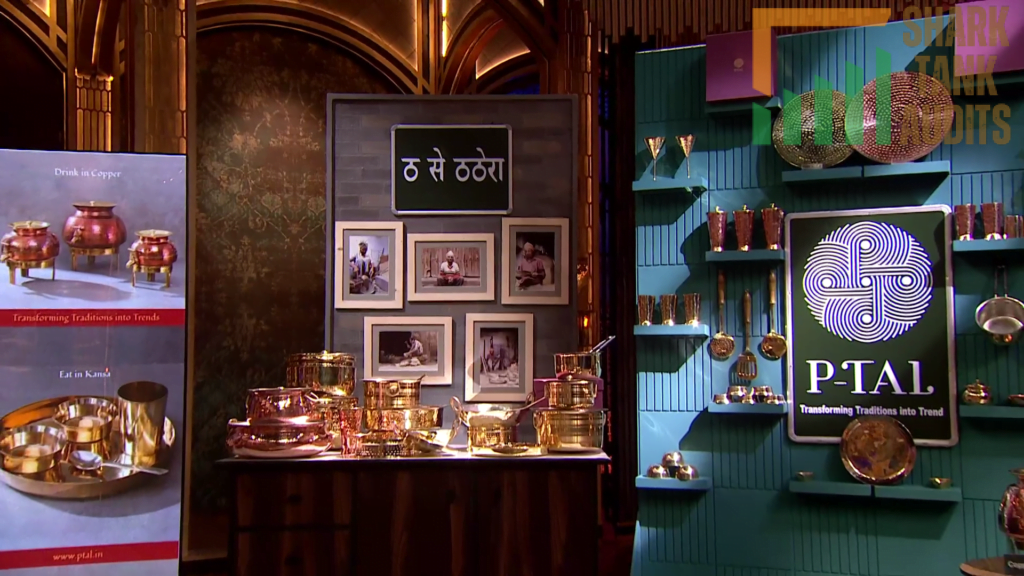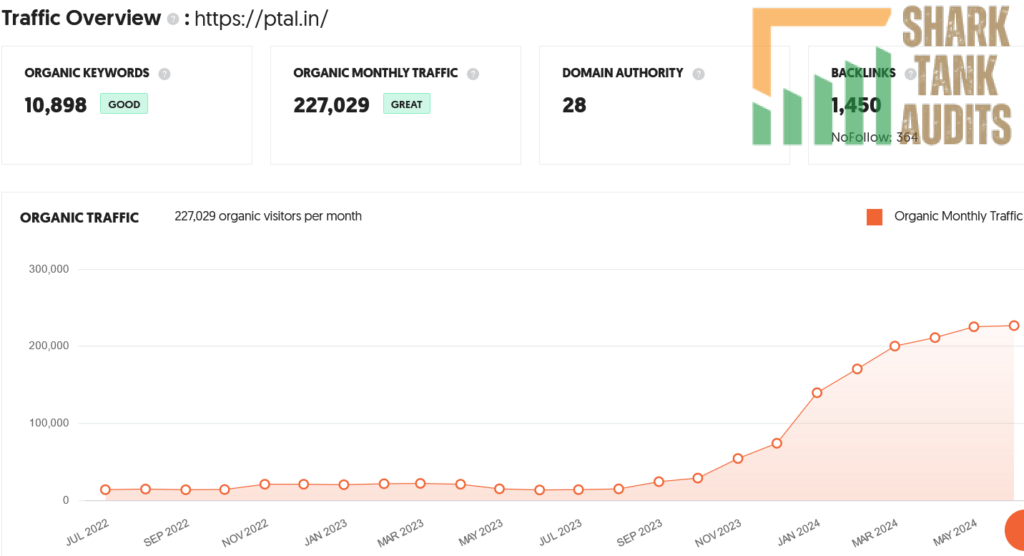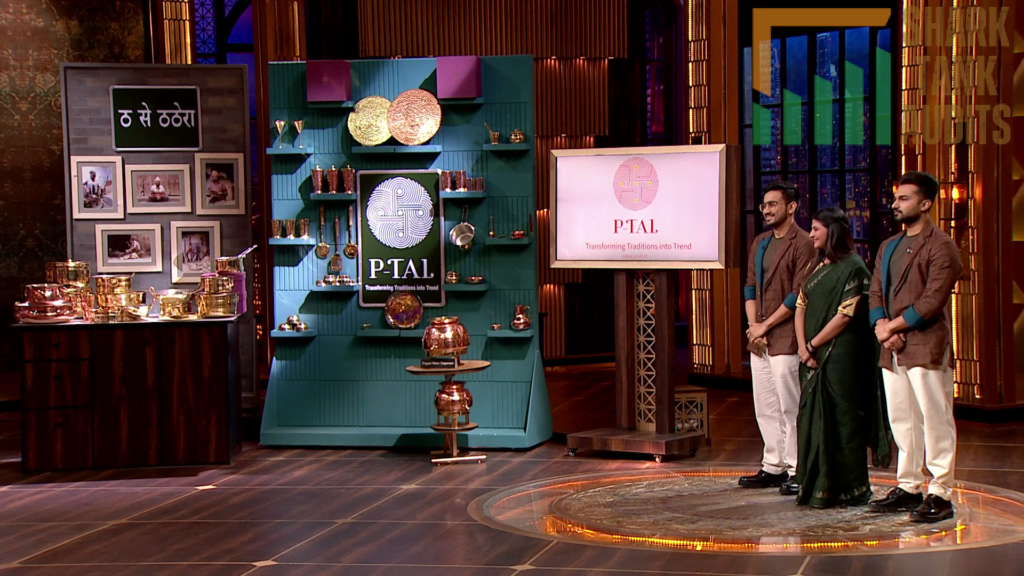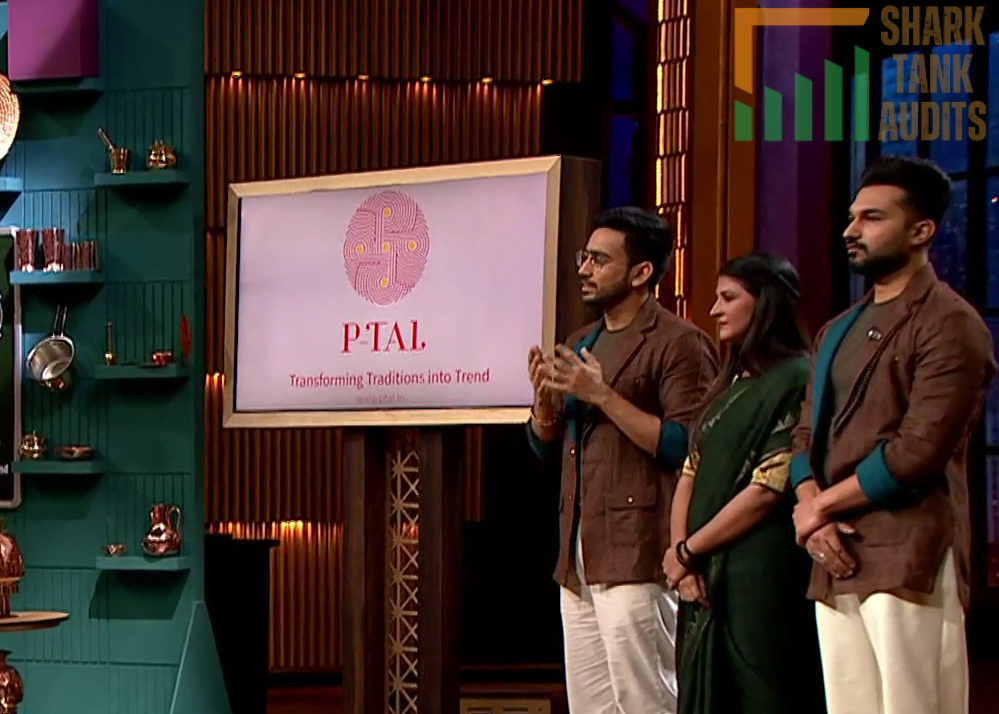P Tal Shark Tank India Episode Review
Website Information:
- Website:- P-Tal
- Build on E-commerce Shopify
- Marketing Automation with Web Engage
- Advertise with Google Ads
- Amazing SEO Performance
- ORGANIC TRAFFIC:- 227,029 organic visitors per month
Founders:
- Aditya Aggarwal, Kirti Goel, and Gaurav Garg are the founders of P-Tal.
- Aditya Aggarwal, CEO: Holds an Economics Honors degree from Shri Ram College of Commerce, overseeing marketing and brand development.
- Kirti Goel, COO: Graduated in fashion from Pearl Academy, manages design innovation and front-end operations.
- Gaurav Garg, CPO: A civil engineering graduate from Punjab University, ensures smooth production and supply chain operations.

About the Company and the Products:
- P-Tal (Punjab Thathera Art Legacy) is a startup from Punjab established in 2019 by Aditya Agarwal, Kirti Goel, and Gaurav Garg.
- Originating as a college project at SRCC by Aditya, the company specializes in traditional utensils crafted from brass, copper, and bronze, adhering to ancient Ayurvedic practices.
- These utensils are handmade by the Thathera Community of Jandiala Guru, Punjab, renowned for their traditional craftsmanship and recognized by UNESCO as an Intangible Cultural Heritage.
- P-Tal provides Ayurvedic and genuine Indian kitchenware, including cooking, eating, and serving utensils.
- The products, made from pure metal sheets and ISO certified, offer health benefits by preserving food nutrients and enhancing flavor.
- The company is dedicated to sustainability, employing eco-friendly production methods and natural materials.
- Every P-Tal product has a distinct hammering finish, representing the skilled craftsmanship of the Thathera community.
- P Tal is committed to reviving traditional craftsmanship through the creation of brass, copper, and kansa vessels.
- The founders seek to maintain heritage techniques and produce timeless items that honor Indian culture and craftsmanship.
- P Tal emphasizes sustainability and authenticity, attracting consumers who value unique and artisanal home decor products.
Shark Tank India Air Date:
- Season 3, Episode 50, 29 March 2024
Shark Tank India Pitch:
- P Tal stood out in Shark Tank India Season 3, grabbing attention with their unique homeware offerings.
- Their vision, “Har Ghar P Tal” (P Tal utensils in every house), led them to ask for ₹50 lakhs for 1% equity from the Sharks.
Shark Tank India Deal:
- Impressed by the pitch and the strong founders, all sharks showed interest in P Tal.
- The founders initially asked for ₹50 lakhs but ended up with a deal of ₹1 crore for 3.2% equity, involving all the sharks—a rare 5-shark deal indicating strong confidence in P Tal’s future.

P Tal Shark Tank India Review Website Data
| Website Information | Details |
|---|---|
| Website | P Tal |
| Build on | E-commerce Shopify |
| Marketing Automation | Web Engage |
| Advertise with | Google Ads |
| SEO Performance | Amazing |
| ORGANIC TRAFFIC | 227,029 organic visitors/month |
| Founders | Details |
|---|---|
| Aditya Aggarwal, CEO | Fashion graduate from Pearl Academy manages design innovation and front-end operations |
| Kirti Goel, COO | Civil engineering graduate from Punjab University ensures smooth production and supply chain operations |
| Gaurav Garg, CPO | Civil engineering graduate from Punjab University, ensures smooth production and supply chain operations |
| About the Company and the Products | Details |
|---|---|
| Startup Name | P Tal (Punjab Thathera Art Legacy) |
| Established | 2019 |
| Founders | Aditya Agarwal, Kirti Goel, and Gaurav Garg |
| Origins | College project at SRCC by Aditya |
| Specialization | Traditional utensils from brass, copper, and bronze |
| Craftsmanship | Handmade by Thathera Community of Jandiala Guru, Punjab, recognized by UNESCO |
| Product Range | Ayurvedic and genuine Indian kitchenware (cooking, eating, serving) |
| Materials | Pure metal sheets, ISO certified |
| Health Benefits | Preserves food nutrients, enhances flavor |
| Sustainability | Eco-friendly production methods, natural materials |
| Craftsmanship Identifier | Distinct hammering finish |
| Mission | Revive traditional craftsmanship, maintain heritage techniques, produce timeless items |
| P Tal Business Potential in India | Details |
|---|---|
| Market Trends | Resurgence of traditional and Ayurvedic products, growing health awareness, rising disposable incomes |
| Unique Value Proposition | Revival of Thathera craftsmanship, Ayurvedic health benefits, high-quality sustainable products, direct-to-consumer model |
| Total Addressable Market (TAM) | Indian kitchenware and home decor market worth USD 15 billion, growing at 10-12% CAGR, with a TAM of approximately USD 750 million for premium and Ayurvedic kitchenware |
| P Tal Ideal Target Audience | Details |
|---|---|
| Demographics | Ages 25-45, urban and Tier-1 cities, middle to upper-middle class |
| Lifestyle | Health-conscious, environmentally aware, interested in traditional Indian culture |
| Psychographics | Values authenticity and heritage, willing to invest in premium and sustainable products, seeks health benefits and Ayurvedic properties |
| P Tal Marketing Strategy | Details |
|---|---|
| Brand Positioning | Premium Ayurvedic kitchenware with heritage focus |
| Marketing Channels | Digital marketing (SEO, SEM, social media, influencer marketing, content marketing), public relations, experiential marketing |
| P Tal Content and Digital Marketing Strategy | Details |
|---|---|
| Content Pillars | Ayurvedic benefits, traditional Indian kitchen culture, product stories, healthy recipes and cooking tips |
| Digital Marketing Channels | SEO-optimized website, engaging social media content, personalized email marketing, influencer partnerships |
| P Tal Distribution Strategy | Details |
|---|---|
| E-commerce | Own website for direct-to-consumer sales |
| Online Marketplaces | Platforms like Amazon, Flipkart |
| Retail Partnerships | Premium home decor stores |
| International Expansion | Markets interested in Indian culture and Ayurveda |
| P Tal Advantages | Details |
|---|---|
| Strengths | Strong brand story, unique product offering, direct-to-consumer model, growing interest in Ayurvedic and sustainable products |
| Opportunities | Potential for international expansion |
| P Tal Challenges | Details |
|---|---|
| Weaknesses | Competition from other kitchenware brands, maintaining product quality, consumer education, customer acquisition costs |
| Reasons for P Tal’s Success | Details |
|---|---|
| Success Factors | Strong market demand, unique value proposition, compelling brand story, direct-to-consumer model, positive media coverage, Shark Tank India investment |
| Mitigation Strategies | Details |
|---|---|
| Strategies | Continuous product innovation, strong customer service, product range diversification, strong supply chain management, loyalty programs |
| P Tal Future Business and Valuation Roadmap | Details |
|---|---|
| Future Plans | Expand product range, offline retail presence, international expansion, diversify customer base, focus on profitability and revenue growth |
P Tal: A Comprehensive Business Plan

P Tal Business Potential in India
Resurgence of Traditional and Ayurvedic Products:
- Growing interest in Ayurvedic practices and traditional Indian products.
- Increased awareness of health benefits associated with copper, brass, and bronze utensils.
- Rising disposable incomes and a preference for premium and sustainable products.
P Tal’s Unique Value Proposition (UVP):
- Revival of traditional Thathera craftsmanship.
- Ayurvedic benefits and health-focused products.
- High-quality, sustainable, and authentic products.
- Direct-to-consumer and online-focused business model.
P Tal Total Addressable Market (TAM)
Indian Kitchenware and Home Decor Market:
- Estimated to be worth USD 15 billion.
- Growing at a CAGR of 10-12%.
- Considering a potential market share of 5% for premium and Ayurvedic kitchenware, the TAM is approximately USD 750 million.
P Tal Ideal Target Audience
Demographics:
- Age: 25-45 years
- Location: Urban and Tier-1 cities
- Income: Middle to upper-middle class
- Lifestyle: Health-conscious, environmentally aware, and interested in traditional Indian culture
Psychographics:
- Value authenticity and heritage.
- Willing to invest in premium and sustainable products.
- Seek products with health benefits and Ayurvedic properties.
P Tal Marketing Strategy
Brand Positioning:
- Premium Ayurvedic kitchenware brand with a strong heritage focus.
- Emphasize the health benefits, sustainability, and authenticity of products.
Marketing Channels:
- Digital Marketing: SEO, SEM, Social Media Marketing (Instagram, Facebook, Pinterest), Influencer Marketing, Content Marketing
- Public Relations: Media coverage, press releases, and partnerships
- Experiential Marketing: Pop-up stores, workshops, and demonstrations
P Tal Content and Digital Marketing Strategy
Content Pillars:
- Ayurvedic benefits of copper, brass, and bronze utensils.
- Traditional Indian kitchen and dining culture.
- Product stories and the craftsmanship behind P Tal products.
- Healthy recipes and cooking tips using P Tal utensils.
Digital Marketing Channels:
- Website: Optimized for SEO, user-friendly e-commerce platform, visually appealing product showcases.
- Social Media: Engaging content, contests, and giveaways to build a strong community.
- Email Marketing: Personalized campaigns, exclusive offers, and loyalty programs.
- Influencer Partnerships: Collaborate with lifestyle, food, and wellness influencers.
P Tal Distribution Strategy
- E-commerce platform: Own website for direct-to-consumer sales.
- Online marketplaces: Expand reach through platforms like Amazon, Flipkart.
- Exclusive retail partnerships: Collaborate with premium home decor stores.
- International expansion: Explore opportunities in markets with an interest in Indian culture and Ayurveda.
P Tal Advantages
- Strong brand story and heritage focus.
- Unique product offering with health benefits.
- Direct-to-consumer model for better control and customer engagement.
- Growing consumer interest in Ayurvedic and sustainable products.
- Potential for international expansion.
P Tal Challenges
- Competition from traditional and modern kitchenware brands.
- Maintaining consistent product quality and supply chain management.
- Educating consumers about the benefits of copper, brass, and bronze utensils.
- Customer acquisition costs and building brand awareness.
Reasons for P Tal’s Success
- Strong market demand for Ayurvedic and sustainable products.
- Unique value proposition and compelling brand story.
- Direct-to-consumer model for better customer engagement.
- Positive media coverage and word-of-mouth recommendations.
- Investment from Shark Tank India providing a boost.
Mitigation Strategies
- Continuous product innovation and development.
- Strong emphasis on customer service and after-sales support.
- Diversification of product range and target markets.
- Building a strong supply chain and inventory management.
- Loyalty programs and customer retention initiatives.
P Tal Future Business and Valuation Roadmap
- Expand product range to include personal care and wellness items.
- Explore offline retail presence through pop-up stores and collaborations.
- International expansion targeting markets with an interest in Indian culture and Ayurveda.
- Diversify customer base to include hotels, restaurants, and wellness centers.
- Focus on profitability and revenue growth to increase valuation.
Note: The provided data and statistics are estimates and should be verified with accurate and up-to-date sources. A thorough market research and competitive analysis is essential for a comprehensive business plan.
Conclusion:
- P Tal is a promising brand known for traditional, eco-friendly homeware, appreciated for its care in production and environmental benefits.
- The article outlines P Tal’s strengths, areas for improvement, growth opportunities, and potential threats.
- As consumer interest in tradition and health grows, P Tal’s unique position remains strong, though it must continue to innovate to maintain its market position.



